Say hello to the captivating African Savannah cat—a breed of intrigue, elegance, and unparalleled allure. These unique creatures are an exotic blend of the wild African Serval and the domestic Siamese cat, a fascinating fusion that sets them apart in the world of felines.
Their striking appearance is a testimony to nature’s creativity. Tall, graceful, and adorned with beautifully patterned coats, Savannah cats make an unforgettable impression. Yet, their appeal extends far beyond aesthetics. Renowned for their intelligence, playful energy, and dog-like loyalty, they are a joy to behold and an even greater delight to interact with.
Over the years, the Savannah cat’s popularity has surged, not only for their stunning looks but also for their charismatic and engaging personalities. They have not merely climbed the popularity charts; they have leapt onto them with the agility and grace characteristic of their breed.
In essence, the African Savannah cat offers an exotic, engaging pet experience, a perfect blend of wild allure and domestic charm. Join us as we journey into their world, discovering what makes these felines a beloved choice for cat enthusiasts worldwide.
Origin and History of the African Savannah Cat
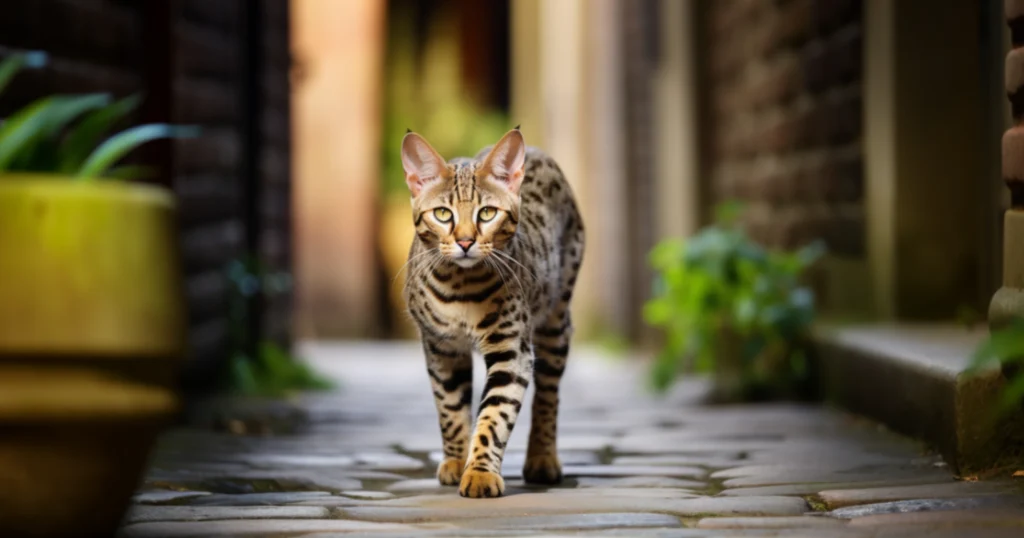
The enthralling tale of the African Savannah Cat’s genesis harks back to the cradle of life itself—Africa. It’s here, amid the continent’s vast savannahs, that the story began. This breed is a stellar example of a successful experiment in hybridization, carefully crafted through the interbreeding of a male wild African Serval Cat and a domestic Siamese cat.
The Beginning of the Savannah Cat Breed
The inception of the Savannah breed is credited to breeder Judee Frank, who, in 1986, successfully birthed the first Savannah kitten named “Savannah”. The kitten’s father was an African Serval named “Trouble”, while her mother, a Siamese, went by the name “Loki”. The birth of Savannah marked the dawn of a new breed, a breed that impeccably blended the ferocity and grandeur of the wild with the affectionate nature of domestic felines.
Savannah’s existence piqued the interest of breeder Patrick Kelly, who bought one of her kittens and, in collaboration with Joyce Sroufe, endeavored to create a new breed. This marked the formal launch of the Savannah breeding program, a significant step that brought a new player onto the feline stage.
Breed Recognition
This intriguing blend of the exotic and domestic soon caught the attention of the International Cat Association. In 2001, Savannah cats were granted “new breed” status, and their championship status followed in 2012. This recognition was a landmark event, officially carving out a space for Savannah cats in the pantheon of feline breeds.
The turn of the millennium has seen an exponential rise in the Savannah cat’s popularity. Pet enthusiasts were swiftly enamored by these cats’ stunning wild appearance, underscored by a demeanor that’s both playful and affectionate. The breed’s official recognition served as a catalyst, escalating the already burgeoning interest in these captivating creatures.
Over the years, Savannah cats have carved out a distinctive niche for themselves. Their unique blend of wild exoticism and endearing pet-like qualities have made them a favorite among cat lovers. Today, they are not only celebrated as a breed but also revered as a symbol of ingenuity and innovation in the world of cats.
Physical Characteristics of the African Savannah Cat
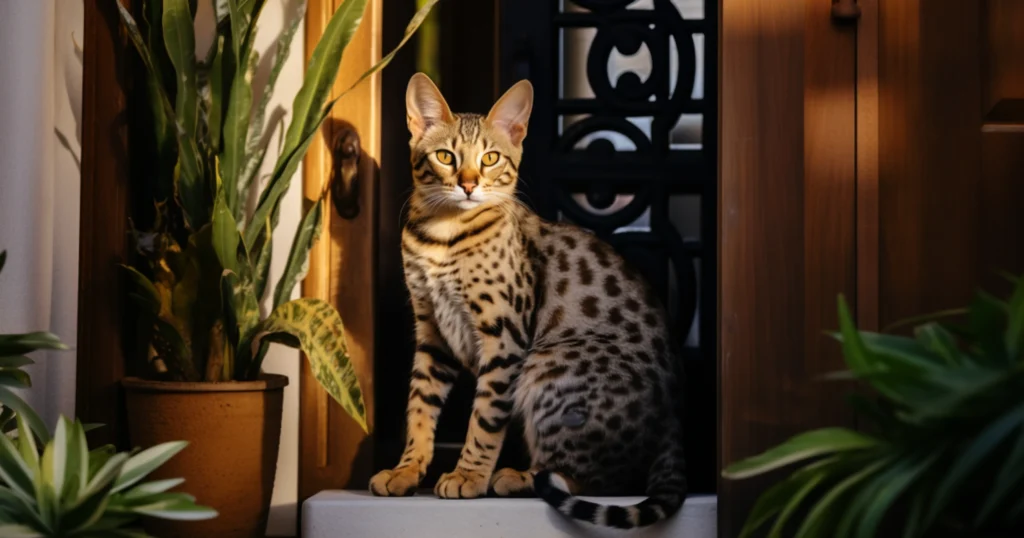
The Savannah cat is a creature of striking aesthetic appeal, reflecting a fine amalgamation of the wild and the tame. The beauty of their physical features lies in their unique blend of Serval-like traits and domestic cat characteristics.
Appearance
From a distance, a Savannah cat’s slender, graceful build, which is typically accentuated by their long, lean legs, is a sight to behold. They stand taller than most domestic cat breeds, a trait they inherit from their African Serval ancestry. It’s not uncommon for Savannah cats to reach or even exceed the height of a small dog. Their legs, one of the longest in proportion to body size among all cat breeds, lend them an elegance and athleticism that is mesmerizing.
Their large, well-defined ears set high on their heads give them a distinctly wild look. The ears are wide with a deep base and rounded at the tips, a feature reminiscent of their African Serval lineage. The striking markings on their ears, called “ocelli”, enhance their exotic appearance.
The coat of a Savannah cat comes in a variety of colors and patterns, adding to their allure. Most Savannahs exhibit a bold, spotted pattern, similar to that of wild African Servals. Their coat color ranges from the golden hue of a lion’s mane to cooler silver tones, and even striking black.
Size
The remarkable size of the Savannah cat sets them apart in the world of feline breeds. While they retain an air of delicate grace, their size is a testament to their mixed heritage and a key factor that contributes to their appeal.
The Savannah cat’s size, much like their coat color and pattern, can vary greatly depending on their generation and the specific influence of Serval and domestic cat genes. Early generation Savannahs (F1 and F2), which have a higher percentage of Serval ancestry, are generally larger, often weighing between 15 to 25 pounds for males and slightly less for females.
Later generation Savannahs (F3 and onwards), while still larger than many domestic breeds, tend to be smaller than their earlier counterparts, usually weighing between 12 to 20 pounds. Despite these weight ranges, it’s essential to note that individual sizes can vary, and not all Savannahs will fall within these brackets.
One feature that is consistent, regardless of size, is their muscular build. Whether large or slightly less so, Savannah cats possess a strong, athletic physique that echoes their wild ancestors’ resilience and agility. Their impressive stature, combined with their inherent grace and elegance, make the Savannah cat a captivating sight, a true testament to the beauty and wonder of nature’s creations.
Personality Traits of the African Savannah Cat
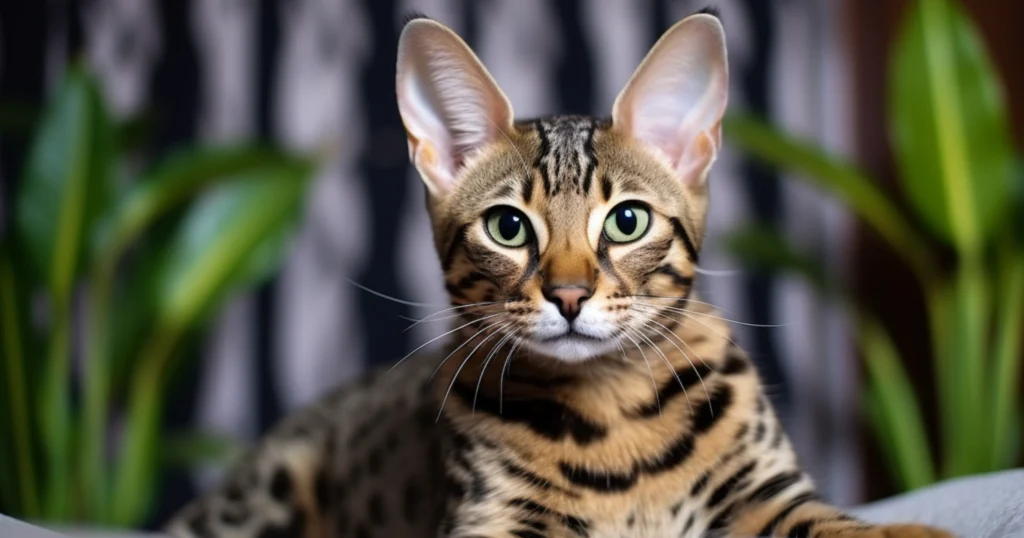
The Savannah cat’s dynamic personality shines as brightly as their unique physical form. A breed set apart not just by its looks, but by its captivating behavior as well.
Savannah Cat Personality
The Savannah cat’s spirit is adventurous and playful, the energy palpable. Curiosity defines them. With an instinctive urge to explore, they’re always on the go. Their senses, razor-sharp. A product of their wild ancestry. They’re quick to investigate any form of stimuli, a testament to their inquisitive nature.
Have a Savannah in your home? Expect lively explorations. They could be darting around, poking into hidden corners, or springing onto lofty shelves with impressive agility. They’re little adventurers at heart.
In their DNA is the wild African Serval, mirrored in their unusual fondness for water. They’re a breed apart from typical domestic cats. No shrinking from water for these felines. A splash in the bathtub? Playing with water from the tap? Joining you for a swim? A Savannah cat says yes to it all.
But it’s not all about play and exploration. Deeply rooted in the Savannah cat’s unique personality is a dog-like loyalty. They form powerful bonds with their human companions. Guard dog-like protective instincts often surface. This is a cat breed that truly looks out for their own. Their attachment, unwavering and profound. It’s an aspect of their personality that makes them all the more endearing.
Interaction with Owners
The interaction between Savannah cats and their owners provides a fascinating glimpse into their sociable and affectionate nature. Despite their wild lineage, Savannah cats are known for their friendly disposition towards their human family members.
Highly sociable, they enjoy the companionship of their owners, often following them around the house. Savannahs are not the type to shy away from attention, instead, they relish in the affection and interaction provided by their human counterparts.
One of the unique aspects of owning a Savannah cat is their adaptability to leash training. These feline companions can be taught to walk on a leash, much like a dog, offering a great opportunity for owners to share outdoor experiences with their Savannah pets. This unique trait, coupled with their adventurous spirit, makes them excellent companions for walks or even hikes.
Adding to their dog-like behavior is their love for playing fetch. A Savannah cat will gladly chase and retrieve small objects thrown by their owners, showing a level of interactive playfulness that is not commonly found in most cat breeds.
This blend of dog-like behavior with the independence and elegance of a cat makes the Savannah breed truly unique. Their warm affection, loyalty, and interactive playfulness endear them to their owners, ensuring that a house with a Savannah cat is never dull but always full of adventure, excitement, and an unending source of love.
Grooming Needs of the African Savannah Cat
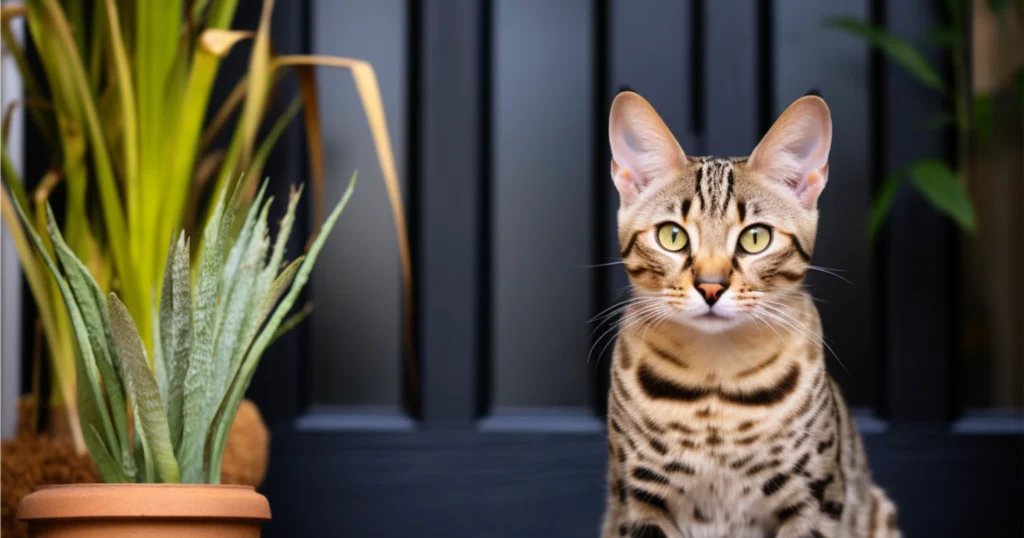
An intriguing aspect of the African Savannah cat is their grooming needs, or the relative lack thereof. Unlike many of their feline brethren, Savannah cats are not intense shedders. This feature, tied to their heritage, makes them an appealing choice for individuals and families who prefer a low-maintenance breed that still boasts of an impressive and attractive appearance.
Derived from their short-haired wild Serval ancestors and domestic short-haired breeds, Savannah cats possess a coat that is plush yet lies close to the body, reducing the volume of hair that typically ends up on furniture and clothes. This short, dense fur provides the Savannah cat with a sleek and elegant silhouette, while also making grooming less demanding compared to long-haired breeds. This lower shedding propensity leads to a relatively cleaner environment, much to the delight of owners who prefer a tidier home.
However, while their grooming needs might be less intense, Savannah cats do require occasional bathing. This is not just because they are a short-haired breed, but also because of their unique affinity for water and a penchant for getting into messy situations. A thorough bath can help remove any dirt or debris they may have collected during their adventurous escapades.
Given their love for water, these cats generally tolerate baths better than many other breeds, making the process smoother for the owner. The use of a gentle, cat-friendly shampoo will ensure their coat remains healthy and shiny while avoiding any skin irritations.
Despite these lower-maintenance grooming needs, regular brushing can benefit a Savannah cat, keeping their coat healthy and free from potential mats, and providing a bonding experience between cat and owner. Brushing also serves as an excellent opportunity to check for any signs of skin issues or parasites. With a simple, consistent grooming routine, the African Savannah cat will stay looking and feeling their best.
Health Concerns and Veterinary Care for the African Savannah Cat
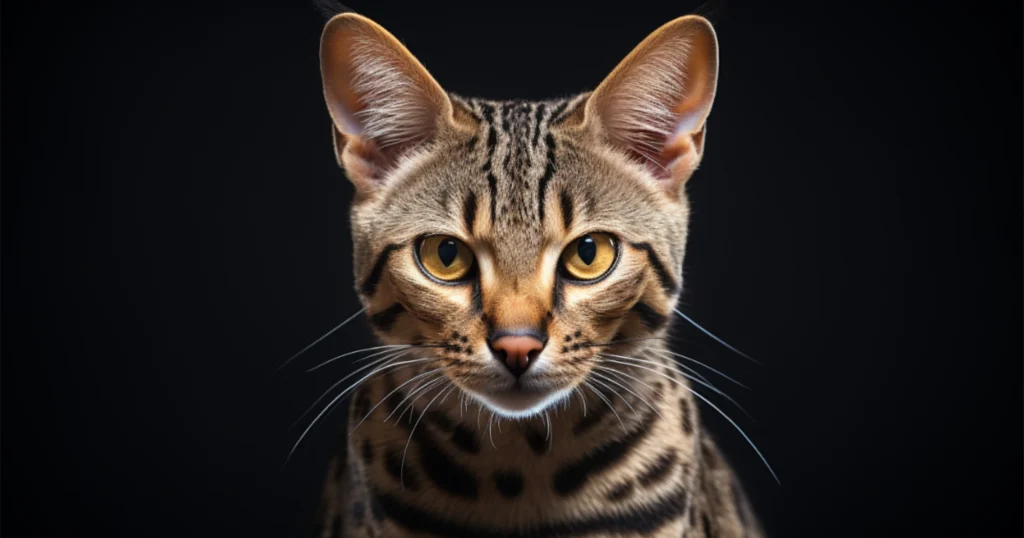
General Health
Savannah cats, mirroring their active and energetic nature, are generally robust and healthy felines. One of the significant benefits of this breed’s wild heritage is its resultant robust health status. Drawing from a broad genetic pool that combines the vitality of the African Serval and various domestic cat breeds, the Savannah cat tends to have fewer inherited health problems than many purebred domestic cats.
They enjoy long lifespans, with many living into their mid to late teens with proper care. Their active and curious nature contributes to their overall physical health, often leading to lower rates of obesity and related health concerns common in more sedentary breeds. Consistent and varied physical activities, alongside a balanced diet, will contribute to maintaining their optimal health.
However, like all pets, Savannah cats are not entirely immune to health issues. Regular veterinary care, including vaccinations and preventative treatments for parasites, is essential to ensure they stay in prime condition. Regular dental cleanings can prevent oral diseases, while spaying or neutering can prevent certain reproductive cancers and unwanted behaviors.
Specific Health Concerns
Despite their generally robust health, Savannah cats are predisposed to a couple of specific health concerns due to their genetic heritage. These include hypertrophic cardiomyopathy (HCM) and progressive retinal atrophy (PRA).
Hypertrophic cardiomyopathy, a form of heart disease that leads to the thickening of the heart muscle, is one such concern. Though relatively rare, it’s important for owners to be aware of this potential issue. Regular vet check-ups, including cardiac screenings, can help detect this condition early, increasing the chances of managing it effectively.
Progressive retinal atrophy, a degenerative eye disease causing progressive vision loss, is another potential concern. It is vital to note that while this condition is not common in the Savannah breed, some individuals may be at risk due to their genetic diversity.
Popularity and Breeding of the African Savannah Cat

Popularity and Demand
The African Savannah cat, with its distinctive beauty and engaging personality, has quickly become one of the most sought-after breeds both in North America and around the globe. Their popularity is in no small part due to their unique blend of domestic companionship and exotic allure.
These cats’ dog-like loyalty, combined with the independent spirit of their wild ancestors, provides an unusual yet highly appealing pet dynamic. Owners get the best of both worlds: a creature that’s loyal, trainable and even leash-walkable like a dog, and one that has the mysterious charm and independence of a cat. Plus, their striking, wild appearance further fuels their demand. They’re a piece of the wild savannah that can be comfortably appreciated at home.
The high energy, playfulness, and general friendliness of the Savannah cat also attract many. They’re perfect for active households looking for a pet that will interact and play, rather than one that will lounge around all day. These combined factors have significantly boosted their popularity and demand across various continents.
Breeding
In the current breeding landscape, breeders of the African Savannah cat can be found scattered across the globe. These dedicated individuals and organizations are united in their efforts to both preserve and improve the breed, constantly striving for the perfect blend of domestic cat traits and the exotic aesthetics of the African Serval.
Breeding a healthy and genetically sound Savannah cat is not a simple task, however. It involves careful selection of the parent cats, ensuring they are healthy and that their traits will complement one another. It’s a process that requires extensive knowledge, patience, and dedication.
Many breeders are part of networks and associations that share the common goal of breed preservation and improvement. They work together to share knowledge and resources, contributing to the ongoing development and popularity of this beautiful breed.
But it’s not just about physical traits. A lot of effort also goes into ensuring that the unique personality of the Savannah cat – their adventurous nature, loyalty, and love for interaction – is maintained in the breeding process.
Conclusion: Why Choose an African Savannah Cat?
Choosing a pet is a deeply personal decision, and there are many factors to consider. For those yearning for an exotic companion with a dynamic personality, an African Savannah cat might just be the perfect choice. The Savannah cat carries an exceptional blend of the wild and domestic world, offering owners a captivating experience unlike any other.
Renowned for their playful, adventurous, and loyal nature, Savannah cats bring a delightful energy to any home. Their dog-like loyalty and trainability combined with their feline independence mean that you get the best of both worlds. They are a breed that loves to play, explore, and engage with their human companions, making them a delightful addition to active households.
A low-maintenance grooming routine and generally robust health are other bonuses, but it’s important to remember that they do have specific health considerations. Regular vet check-ups are vital to ensure they remain in top-notch health.
Adopting a Savannah cat is more than just bringing a pet home—it’s becoming part of a global community dedicated to the preservation and betterment of this distinctive breed. Responsible breeding and ownership are fundamental to ensure the ongoing health, happiness, and global popularity of Savannah cats. After all, in choosing a Savannah, you are choosing a slice of the wild savannah to bring into your family fold, and that’s a decision that carries both delight and responsibility.


